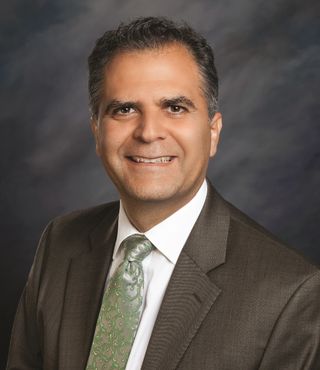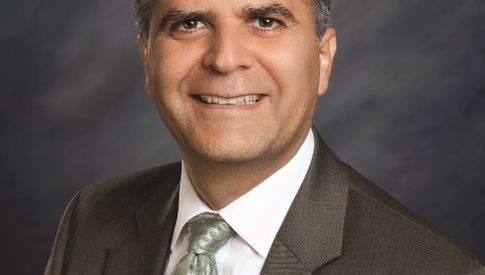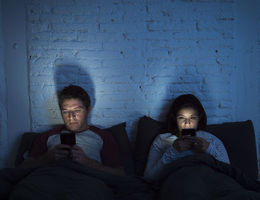We’re Stronger Together
With your help, we can make ambitious innovations in clinical care and education for our community.
Sleep disorders can make it a struggle to fall asleep and stay asleep. More than just exhaustion and frustration, though, sleep disorders can seriously damage your physical and mental health.
Loma Linda University Health’s expert sleep doctors diagnose and treat sleep disorders affecting you or your loved one. Our goal is to make sleeping easier and more refreshing, no matter what’s disrupting your sleep.


“We each sleep during one-third of our lifetime and how we sleep affects our waking hours. At the Loma Linda Sleep Disorders Center we are committed to help our patients obtain restful sleep and live healthy and productive lives.”
Our team of sleep specialists is able to treat a wide variety of sleep disorders. These include:
Sleep apnea is one of the most common sleep disorders. When you have sleep apnea, your body isn’t getting enough oxygen while asleep, reducing sleep quality and impacting your health. The causes can be physical abnormalities, obesity or even differences in how your brain signals your body to breathe.
If you have sleep apnea, our sleep care team is ready to help you get the restful sleep you need. Our sleep specialists provide medical, behavioral and surgical treatments for sleep apnea.
You may have a sleep disorder and not even know it. A sleep study is often the first step to diagnosing your sleep disorder before creating a treatment plan. Your primary care doctor can help decide if a sleep study is right for you.
You can get a sleep study without first seeing your doctor for a referral. However, we recommend speaking to your doctor first to rule out other causes of poor sleep. Talk to your doctor if you’re experiencing these common symptoms:
Most overnight sleep studies take place at our Sleep Disorders Center, located in Loma Linda. Here, doctors and other specialists trained in sleep medicine help diagnose and provide treatment for both common and rare sleep disorders.
Sleep Disorders Center
American Academy of Sleep Medicine (AASM) Accredited
11360 Mountain View Ave
Hartford Building, Suite D
Loma Linda, CA 92354
Our sleep center helps you feel comfortable during your sleep study. When you arrive, you’ll find a clean and safe sleeping environment. You’re welcome to bring anything you need to sleep comfortably, including your own pillow and toiletries.
If you’re unable to stay overnight at our sleep center, we offer at-home sleep testing. We’ll provide you with a home sleep test device and easy-to-follow instructions. After testing, you’ll drop off the device at our sleep center and we’ll begin processing your results. Your primary care doctor can help you decide if it’s best to complete your sleep study at home.
For sleep study appointments scheduled at our Sleep Disorders Center, you’ll get a reminder call from us two days beforehand. The day of your study, we’ll call again to confirm your appointment. If you won’t be able to keep your appointment, please call us at least 24 hours in advance at 909-558-6344.
Your sleep study takes place overnight. If your study is performed at our Sleep Disorders Center, additional daytime testing may be required depending on your results. You should plan to stay at the Sleep Disorders Center until 5 p.m. the following day.
You’ll need to bring a few items to your sleep study, including your:
You should also bring anything you would normally need for the night, including your:
Eat before arriving. Unfortunately, you can’t bring your dinner with you. Complimentary continental breakfast and lunch are provided for patients who need testing the following day. Water will be available throughout your stay.
Come with clean hair, without weaves or braids. Don’t use hair products like oils, gels lotions or creams. These can prevent us from properly placing the sensors to your scalp.
Ring the doorbell when you arrive at the sleep center. The front door will be locked, but don’t worry — we’re here. Our night time staff arrives at 6:30 p.m. and your study will be scheduled to begin later than that.
Bring an adult caregiver if necessary. Your caregiver must be an adult over the age of eighteen who can help you get in and out of bed if needed. Your caregiver will stay in the same room as you on a separate bed.
Completing a sleep study is simple since you’ll spend most of your time asleep. Meanwhile, we’ll use specialized equipment to measure how well you sleep. The study is completely non-invasive, but does require some wires to be attached to your body. Most people easily adjust to these and fall asleep comfortably.
While you sleep, our highly-trained sleep technologists monitor your brain activity, body movements, breathing patterns, eye movements and heart rhythm. Your sleep technologist is there to help if you need anything during the night.
Our sleep doctors use the data collected during your study to diagnose your sleep disorder. It usually takes about two weeks to get your results. If you require additional treatment, you’ll be referred to our sleep clinic.
Depending on the disorder, a team of sleep specialists is available to help build the best treatment plan for you. Our team focuses on what really works for you, giving you the rest and relief you’ve been needing.
Patients often see improvement in their sleep when using medical treatments. These treatments may include prescription medicines or use of a continuous positive airway pressure (CPAP) machine or similar device.
Because sleep apnea restricts breathing during sleep (usually due to collapsed tissues in the throat), CPAP can help treat the disorder. CPAP helps you breathe by pushing air through a wearable mask, opening those collapsed tissues while you sleep.
Lifestyle changes may be able to help you get better rest. Many of us don’t realize we’re damaging the quality of our sleep with bad sleep habits. We’ll help you change poor sleep habits and develop new beneficial habits, including:
Surgery may be needed if your sleep disorder is caused by a physical abnormality affecting a specific area in the throat. In some cases of sleep apnea, surgery may benefit you.
Our sleep specialists will work with expert surgeons to determine if surgery is a good choice for your sleep disorder. You might get the best results from a combination of surgery and other treatments.
You can also improve sleep quality by exercising, eating healthy, maintaining a healthy weight and taking care of your mental health. We’ll share your sleep study results with your primary care doctor, who can help you in these areas.
Ignoring sleep issues can lead to serious health issues and impact your personal and professional life. Ask your primary care doctor if a sleep study is right for you.
Sleep disorders can also affect your child’s health. If your child is having trouble sleeping or difficulty concentrating at school, visit our pediatric sleep disorders page to learn more. Then talk to your pediatrician, who can help you determine if a sleep study is right for your child.



“We each sleep during one-third of our lifetime and how we sleep affects our waking hours. At the Loma Linda Sleep Disorders Center we are committed to help our patients obtain restful sleep and live healthy and productive lives.”
Our team of sleep specialists is able to treat a wide variety of sleep disorders. These include:
Sleep apnea is one of the most common sleep disorders. When you have sleep apnea, your body isn’t getting enough oxygen while asleep, reducing sleep quality and impacting your health. The causes can be physical abnormalities, obesity or even differences in how your brain signals your body to breathe.
If you have sleep apnea, our sleep care team is ready to help you get the restful sleep you need. Our sleep specialists provide medical, behavioral and surgical treatments for sleep apnea.
You may have a sleep disorder and not even know it. A sleep study is often the first step to diagnosing your sleep disorder before creating a treatment plan. Your primary care doctor can help decide if a sleep study is right for you.
You can get a sleep study without first seeing your doctor for a referral. However, we recommend speaking to your doctor first to rule out other causes of poor sleep. Talk to your doctor if you’re experiencing these common symptoms:
Most overnight sleep studies take place at our Sleep Disorders Center, located in Loma Linda. Here, doctors and other specialists trained in sleep medicine help diagnose and provide treatment for both common and rare sleep disorders.
Sleep Disorders Center
American Academy of Sleep Medicine (AASM) Accredited
11360 Mountain View Ave
Hartford Building, Suite D
Loma Linda, CA 92354
Our sleep center helps you feel comfortable during your sleep study. When you arrive, you’ll find a clean and safe sleeping environment. You’re welcome to bring anything you need to sleep comfortably, including your own pillow and toiletries.
If you’re unable to stay overnight at our sleep center, we offer at-home sleep testing. We’ll provide you with a home sleep test device and easy-to-follow instructions. After testing, you’ll drop off the device at our sleep center and we’ll begin processing your results. Your primary care doctor can help you decide if it’s best to complete your sleep study at home.
For sleep study appointments scheduled at our Sleep Disorders Center, you’ll get a reminder call from us two days beforehand. The day of your study, we’ll call again to confirm your appointment. If you won’t be able to keep your appointment, please call us at least 24 hours in advance at 909-558-6344.
Your sleep study takes place overnight. If your study is performed at our Sleep Disorders Center, additional daytime testing may be required depending on your results. You should plan to stay at the Sleep Disorders Center until 5 p.m. the following day.
You’ll need to bring a few items to your sleep study, including your:
You should also bring anything you would normally need for the night, including your:
Eat before arriving. Unfortunately, you can’t bring your dinner with you. Complimentary continental breakfast and lunch are provided for patients who need testing the following day. Water will be available throughout your stay.
Come with clean hair, without weaves or braids. Don’t use hair products like oils, gels lotions or creams. These can prevent us from properly placing the sensors to your scalp.
Ring the doorbell when you arrive at the sleep center. The front door will be locked, but don’t worry — we’re here. Our night time staff arrives at 6:30 p.m. and your study will be scheduled to begin later than that.
Bring an adult caregiver if necessary. Your caregiver must be an adult over the age of eighteen who can help you get in and out of bed if needed. Your caregiver will stay in the same room as you on a separate bed.
Completing a sleep study is simple since you’ll spend most of your time asleep. Meanwhile, we’ll use specialized equipment to measure how well you sleep. The study is completely non-invasive, but does require some wires to be attached to your body. Most people easily adjust to these and fall asleep comfortably.
While you sleep, our highly-trained sleep technologists monitor your brain activity, body movements, breathing patterns, eye movements and heart rhythm. Your sleep technologist is there to help if you need anything during the night.
Our sleep doctors use the data collected during your study to diagnose your sleep disorder. It usually takes about two weeks to get your results. If you require additional treatment, you’ll be referred to our sleep clinic.
Depending on the disorder, a team of sleep specialists is available to help build the best treatment plan for you. Our team focuses on what really works for you, giving you the rest and relief you’ve been needing.
Patients often see improvement in their sleep when using medical treatments. These treatments may include prescription medicines or use of a continuous positive airway pressure (CPAP) machine or similar device.
Because sleep apnea restricts breathing during sleep (usually due to collapsed tissues in the throat), CPAP can help treat the disorder. CPAP helps you breathe by pushing air through a wearable mask, opening those collapsed tissues while you sleep.
Lifestyle changes may be able to help you get better rest. Many of us don’t realize we’re damaging the quality of our sleep with bad sleep habits. We’ll help you change poor sleep habits and develop new beneficial habits, including:
Surgery may be needed if your sleep disorder is caused by a physical abnormality affecting a specific area in the throat. In some cases of sleep apnea, surgery may benefit you.
Our sleep specialists will work with expert surgeons to determine if surgery is a good choice for your sleep disorder. You might get the best results from a combination of surgery and other treatments.
You can also improve sleep quality by exercising, eating healthy, maintaining a healthy weight and taking care of your mental health. We’ll share your sleep study results with your primary care doctor, who can help you in these areas.
Ignoring sleep issues can lead to serious health issues and impact your personal and professional life. Ask your primary care doctor if a sleep study is right for you.
Sleep disorders can also affect your child’s health. If your child is having trouble sleeping or difficulty concentrating at school, visit our pediatric sleep disorders page to learn more. Then talk to your pediatrician, who can help you determine if a sleep study is right for your child.

With your help, we can make ambitious innovations in clinical care and education for our community.